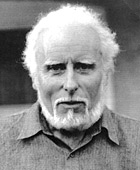
I came across a pretty cool poem in the latest issue of the New Yorker by Jack Gilbert. It's innocent and youthful and explorative. Check it out.
Waiting and Finding
by Jack Gilbert
While he was in kindergarten, everybody wanted to play
the tomtoms when it came time for that. You had to
run in order to get there first, and he would not.
So he always had a triangle. He does not remember
how they played the tomtoms, but he sees clearly
their Chinese look. Red with dragons front and back
and gold studs around that held the drumhead tight.
If you had a triangle, you didn't really make music.
You mostly waited while the tambourines and tomtoms
went on a long time. Until there was a signal for all
traingle people to hit them the right way. Usually once.
Then it was tomtoms and waiting some more. But what
he remembers is the sound of the triangle. A perfect,
shimmering sound that has lasted all his long life.
Fading out and coming again after a while. Getting lost
and the waiting for it to come again. Waiting meaning
without things. Meaning love sometimes dying out,
sometimes being taken away. Meaning that he often lives
silent in the middle of the world's music. Waiting
for the best to come again. Beginning to hear the silence
as he waits. Beginning to like the silence maybe too much.
This poem goes through a lot. It starts with a boy in kindergarten who doesn't follow the same path as his peers. He likes different things and has different interests, the focus of those interests being musical. It's interesting to analyze that differnce through music, the distinctly different sound of an insignificant instrument (yet which is so crucial to a song at times).
It goes through this boy playing the triangle in the class's song, but he didn't really have to make music, he just bangs the shit out of the instrument, and that does something for him. It seems theraputic.
Waiting, to play his instrument, means to him without things, love dying out, being taken away, being silent amidst the music, waiting for the best to come. It seems like most of the excitement and thrill comes from the waiting, and then when the waiting is over and the time comes, then is where he begins "finding," referencing the name of the poem. His playing seems to help him find things about himself, but he must be patient in the waiting to get there.
Maybe I'm reading too deep into it, or maybe I'm missing a lot.
What do you think of "Waiting and Finding?"

1 comment:
Thank you for posting this poem, which I enjoyed reading and reflecting upon. I do not think the author preferred the triangle, rather it fell to him because he didn't like to jump into the swirling chaos of chasing after the instrument held in highest esteem by all the boys. Having fallen to him, he learned to enjoy its particular characteristics and then be shaped by them. He learned about life and value, not from the banging on a drum, but from that wonderful thing that life may happen to bring, but rarely - the "left-over". He not only waited for the moment to play a single strike, but he found value in that singular note as well. The sound lingered, then faded and then reappeared with the resonance of chiming metal. This is something that could easily missed if one is busy banging away, or expecting this instrument to be like any other, but it is tenacious in its slightness.
A nuanced life isn't boastful, nor does it expect to make its own way. It waits in growing patience until life makes the way to be found.
Post a Comment